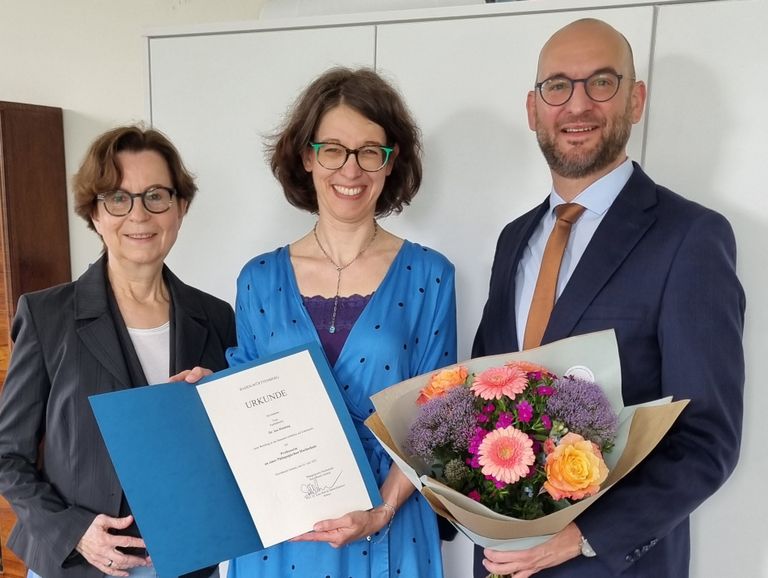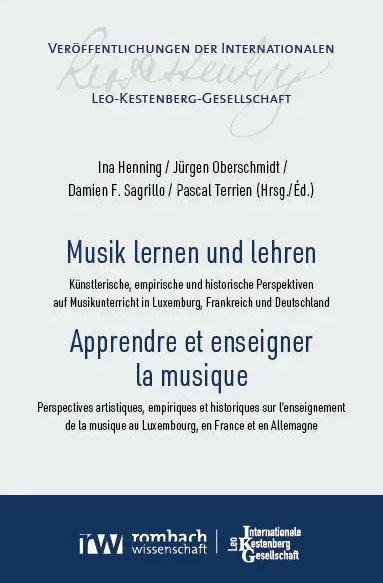künstlerische und wissenschaftliche Aktivitäten

Contesting and Transmissing Polyphonic Jewish Heritage. Strategies and Practices of Authorization. Teilprojekt: "Deconstructing Jewish Heritage in Music: Promoting Inclusive Perspectives in Teacher Professionalization"
Drittmittelprojekt 2022-2026
Das interdisziplinäre Projekt untersucht anhand von zwei Fallstudien die komplexe Aushandlung und vielstimmige Überlieferung jüdischen Erbes im Sinne der Critical Heritage Studies. Zentrales Ziel ist es, jüdisches Erbe nicht wie bisher häufig geschehen als homogenes Gebilde zu begreifen, sondern seine Ambivalenzen und Komplexitäten und insbesondere seine Genese in Strategien und Praktiken der Überlieferung empirisch herauszuarbeiten.
Im Sinne des Schwerpunktprogramms wird zum einen herausgearbeitet, wie jüdisches Erbe aktualisiert, an zeitgenössische Diskurse gekoppelt und dadurch rekonfiguriert wird. Zum anderen zeigt es, wie diese Rekonfiguration auch für einen kulturell-analytisches Feld der Theorie und Praxis Musikpädagogik an Schulen fruchtbar gemacht werden kann, einem Kontext, in dem jüdisches Erbe bislang weitgehend homogenisiert präsentiert wird.
Inspiriert von den Perspektiven der Critical Heritage Studies macht das Projekt Formen und Strategien der Autorisierung (in den untersuchten Initiativen wie auch in didaktischen Unterrichtsmodellen) in Formaten und Praktiken der Vermittlung jüdischen Erbes sichtbar. Das Projekt fragt unter Einbeziehung jüdischer Akteure gouvernementalitätskritisch nach den normativen Implikationen und untersucht insbesondere, wie monolithische Lesarten des jüdischen Erbes mit Hilfe zeitgenössischer Konzepte von Heterogenität und Diversität in Frage gestellt werden.
The interdisciplinary project examines the complex negotiation and polyphonic transmission of Jewish heritage in the sense of critical heritage studies by conducting two case studies. The central aim is not to conceive of Jewish heritage as a homogeneous entity as has often been the case to date, but to empirically work out its ambivalences and complexities and, in particular, its genesis in strategies and practices of transmission. In the sense of the priority programme, the project works out on the one hand how Jewish heritage is updated, coupled to contemporary discourses and thereby reconfigured. Furthermore, it shows how this reconfiguration can also be made fruitful for cultural-applied music education at schools, a context in which Jewish heritage has so far been presented in a largely homogenised way.
Inspired by the perspectives of Critical Heritage Studies, the project makes visible forms and strategies of authorisation (in the initiatives studied as well as in didactic teaching models) in formats and practices of the transmission of Jewish heritage. The project asks with involvement of Jewish actors about the normative implications in a way that is critical of governmentality and, in particular, examines how monolithic readings of Jewish heritage are called into question with the help of contemporary concepts of heterogeneity and diversity.
Mehr unter:

Neue W3-Professur für Musik und ihre Didaktik an der PH Schwäbisch Gmünd besetzt
Schwäbisch Gmünd, Juni 2025
Die Pädagogische Hochschule Schwäbisch Gmünd freut sich über die Ernennung von Prof. Dr. Ina Henning zur neuen Professorin für Musik und ihre Didaktik. Mit ihrer Berufung erhält das Fach Musik eine zukunftsweisende Stimme, die Forschung und Lehre eng miteinander vernetzt und dabei sowohl auf regionale Verankerung als auch internationale Kooperationen setzt.
Ina Henning verfolgt das Ziel, die Disziplin der Musikpädagogik vielfältig und zeitgemäß im Spannungsfeld von Grundlagen- und Transferforschung weiterzuentwickeln. Im Einklang mit den Zielen der Hochschule wird die Professur insbesondere zur Stärkung des Dialogs zwischen Bildung, Gesellschaft und Politik beitragen.
Inhaltliche Schwerpunkte setzt Prof. Henning auf zentrale Themen wie Inklusion, Nachhaltigkeit, Inter- und Transdisziplinarität sowie kulturelle Bildung im internationalen Kontext. „Musikmachen verbindet. Gerade das Studium des Faches Musik bietet Chancen, die individuelle Lehrkräftepersönlichkeit zu stärken, aber auch gemeinsam Resilienz für kommende Herausforderungen zu sammeln. Ich möchte über vielfältige Angebote eine Breite des Horizonts bieten sowie die Lust auf die pädagogische Vermittlung von Musik wecken," so Henning.
Foto: Rektor Sabla-Dimitrov und Abteilungsleiterin Prof. Dr. Gabriele Hofmann gratulieren herzlich und freuen sich auf die kommenden Impulse in Forschung, Lehre und kulturellem Austausch.
The University of Education Schwäbisch Gmünd is delighted to announce the appointment of Prof. Dr. Ina Henning as the new Professor of Music and its Didactics. Her appointment gives the subject of music a forward-looking voice that closely links research and teaching, focussing on both regional roots and international cooperation.
Ina Henning pursues the goal of further developing the discipline of music education in a diverse and contemporary way in the field of tension between basic and transfer research. In line with the aims of the University, the professorship will contribute in particular to strengthening the dialogue between education, society and politics.
Prof. Henning will focus on key topics such as inclusion, sustainability, inter- and transdisciplinarity and cultural education in an international context. "Making music unites. Studying the subject of music in particular offers opportunities to strengthen the individual personality of teachers, but also to collectively build resilience for future challenges. I would like to offer a wide range of programmes to broaden horizons and awaken an interest in the pedagogical teaching of music," says Henning.
Photo: Dean Prof. Dr. Sabla-Dimitrov and Head of Department Prof. Dr. Gabriele Hofmann offer their warmest congratulations and look forward to the impetus in research, teaching and cultural exchange to come.
Mehr unter:
https://www.ph-gmuend.de/die-ph/lehrende/h/henning-ina

neue Herausgabe
Musik lernen und lernen | Apprendre et enseigner la musique
Herausgegeben von
Prof. Dr. Ina Henning,
Prof. Dr. Jürgen Oberschmidt,
Prof. Dr. Damien F. Sagrillo,
Prof. Dr. Pascal Terrien
Künstlerische, empirische und historische Perspektiven auf Musikunterricht in Luxemburg, Frankreich und Deutschland | Perspectives artistiques, empiriques et historiques sur l'enseignement de la musique au Luxembourg, en France et en Allemagne
Rombach-Verlag , 1. Auflage 2025, 290 Seiten
Das Werk ist Teil der Reihe Veröffentlichungen der Internationalen Leo-Kestenberg-Gesellschaft
Buch 74,00 €
ISBN 978-3-96821-918-9
Lieferbar
eBook
0,00 €
ISBN 978-3-96821-919-6
Lieferbar
Der vorliegende Sammelband fasst die Ergebnisse der Jahrestagung der Internationalen Leo-Kestenberg-Gesellschaft (IKG) im Mai 2022 an der Universität Luxemburg in französischer und deutscher Sprache zusammen. Im Zentrum steht die Auseinandersetzung mit der Thematik »Musik lernen und lehren« aus ländervergleichender Perspektive. Neben historischen Blickwinkeln steht der Dialog zwischen den Spannungsfeldern Forschung und unterrichtlicher Praxis, der die in Lehr- und Lernprozessen angewandten Methoden beleuchtete, sowie künstlerische Perspektiven im Mittelpunkt dieses Austauschs. Um die Authentizität der Denkstrukturen in den 14 Beiträgen zu bewahren, werden die jeweiligen Abhandlungen in ihren Muttersprachen veröffentlicht.
Mit Beiträgen von
Manon Ballester | Pascale Batézat-Batellier | Adrien Bourg | Muriel Deltand | Andreas Eschen | Matthias Goebel | Ina Henning | Emmanuelle Huart | Wolfgang Lessing | Jelena Martinović-Bogojević | Jürgen Oberschmidt | Nina Perović | Lisa La Pietra | Anna-Christine Rhode-Jüchtern | Damien Sagrillo | Dietmar Schenk | Pascal Terrien | Theda Weber-Lucks
This anthology summarises the results of the annual conference of the International Leo Kestenberg Society (IKG) in May 2022 at the University of Luxembourg in French and German. The focus is on the topic of ‘learning and teaching music’ from a comparative perspective. In addition to historical perspectives, the dialogue between the conflicting fields of research and teaching practice, the methods used in teaching and learning processes and artistic perspectives are at the heart of this exchange. In order to preserve the authenticity of the thought structures in the 14 contributions, the respective essays are published in their native languages.
With contributions from
Manon Ballester | Pascale Batézat-Batellier | Adrien Bourg | Muriel Deltand | Andreas Eschen | Matthias Goebel | Ina Henning | Emmanuelle Huart | Wolfgang Lessing | Jelena Martinović-Bogojević | Jürgen Oberschmidt | Nina Perović | Lisa La Pietra | Anna-Christine Rhode-Jüchtern | Damien Sagrillo | Dietmar Schenk | Pascal Terrien | Theda Weber-Lucks
mehr unter:
https://www.nomos-shop.de/de/p/musik-lernen-und-lehren-apprendre-et-enseigner-la-musique-gr-978-3-96821-918-9